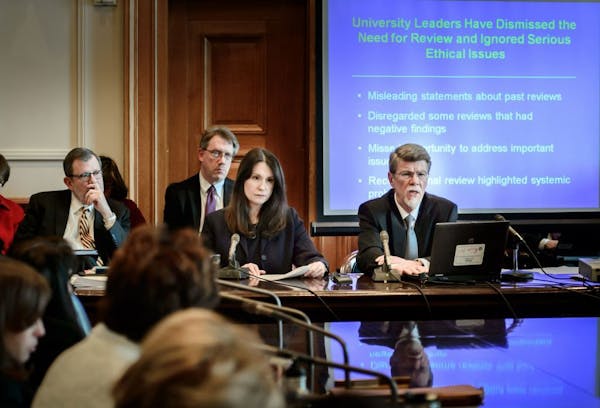For the first time, University of Minnesota scientists will be barred from accepting consulting fees from companies that sponsor their research, under a new ethics plan endorsed Friday by the Board of Regents.
President Eric Kaler says the new rule, which is designed to guard against conflicts of interest, is one of the strictest in the country among academic research centers.
The regents unanimously endorsed the 75-page plan, which recommends a series of changes to tighten safeguards for patients who volunteer in university research trials.
The plan was commissioned in the wake of widespread criticism of research practices at the U's psychiatry department and its handling of a 2004 drug study during which a 27-year-old patient, Dan Markingson, committed suicide.
Dr. William Tremaine of the Mayo Clinic, who led the task force that drafted the plan, said that one of the goals is to ensure that vulnerable patients like Markingson, who had schizophrenia, "know what they're getting into" and aren't coerced into studies.
"That's been a huge concern at the university over the last 11 years," Tremaine said Thursday, as he briefed the regents on the proposals.
The plan calls for beefing up scrutiny of research involving patients, and paying experts to serve on oversight panels.
It also takes a harder line on potential conflicts of interest. In the past, U scientists were permitted to do research for drug companies while serving as their paid consultants at the same time.
Under the new plan, they'll have to choose one or the other, Tremaine said. "That's going to be threatening to some individuals," he noted. "It's your choice. If you want the payments, then don't do the research."
Dr. Charles Schulz, who stepped down as chairman in April after a series of scathing reports about his department, was one of the psychiatrists involved in the Markingson case. He said he thought the changes were "very appropriate."
Schulz acknowledged that he had received consulting fees in the past while conducting industry-sponsored research. At the time, he said, it was permitted as long as the payments were disclosed; but he said he understands the university's move to change the rules.
"That's not an unreasonable plan for the university," he said. "I think it's going to be a very good plan."
Schulz said he will retire at the end of the year.
The full plan can be found at tinyurl.com/olnwhva.
Maura Lerner • 612-673-7384

Mosquitos are back and so are the workers trying to keep their numbers down
Officials ID teen who died after jumping into southwestern Minnesota lake to retrieve canoe paddle
Charges: Man fatally stabbed woman in neck outside downtown Duluth bar after closing time
Charges: Man posed as woman in video chats, lured men into sexually exploiting youngest of children

